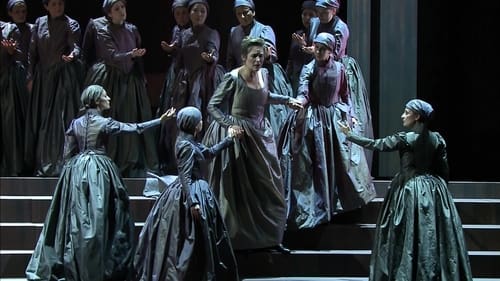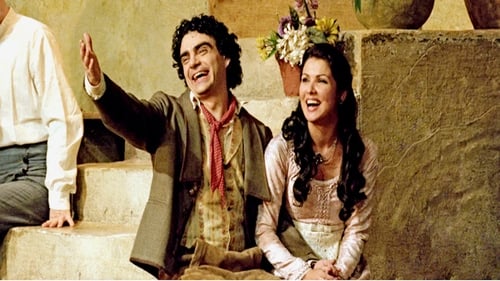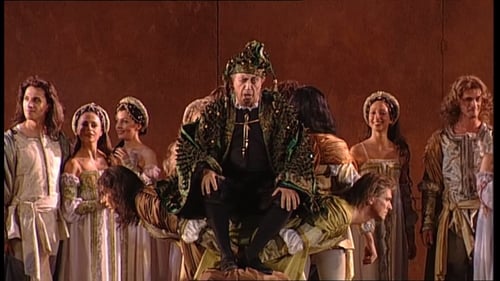
Giorgio Germont
Arena di Verona Opera Festival 2019 starts with La Traviata in the new stage design signed by Franco Zeffirelli, the last great Master of Italian direction. The new production takes the form of the ultimate synthesis of his aesthetic thoughts on Traviata.

Figaro

Francesco Foscari
Part of Tutto Verdi series - I due Foscari (2009) Parma

Francesco Foscari
I due Foscari was Verdi's sixth opera and based on Lord Byron's play The Two Foscari. Rich in intrigue, the plot tells of the final days of the famous Venetian doge, Francesco Foscari, and his illegal overthrow in 1457.

Nabucodonosor
Live performance from Teatro dell'Opera di Roma, March 2011.

Guido De Monforte
Part of Tutto Verdi series 'I vespri siciliani' ('The Sicilian Vespers') is a five-act Italian opera originally written in French for the Paris Opéra and translated into Italian shortly after its premiere in June 1855. Under its original title, 'Les vêpres siciliennes', the libretto was prepared by Eugène Scribe and Charles Duveyrier from their work 'Le duc d'Albe', which was written in 1838 and offered to Halévy and Donizetti before Verdi agreed to set it to music in 1854. The story is loosely based on a historical event, the Sicilian Vespers of 1282, using material drawn from the medieval Sicilian tract 'Lu rebellamentu di Sichilia'.

Simon Boccanegra
Part of Tutto Verdi series - Simon Boccanegra (2010) Parma. Revised version (1881). 'Simon Boccanegra' is an opera with a prologue and three acts by Giuseppe Verdi to an Italian libretto by Francesco Maria Piave, based on the play 'Simón Bocanegra' (1843) by Antonio García Gutiérrez, whose play 'El trovador' had been the basis for Verdi's 1853 opera, 'Il trovatore'. Simon Boccanegra was first performed at Teatro La Fenice in Venice on 12 March 1857

Nabucodonosor
Part of Tutto Verdi series - Nabucco (2009) Parma. NABUCCO was Verdi’s third work for the stage and proved his first great success when performed in 1842. It deals with the Hebrew’s attempts to break free from the yoke of their Babylonian oppressors and is nowadays numbered among Verdi’s most popular works, not least on account of its famous Chorus of Hebrew Slaves, which has one of the best-loved melodies in the whole history of opera.

Rigoletto
Live recording at Parma Verdi Festival 6 October, 2008. Massimo Zanetti conducting Orchestra e Coro del Teatro Regio di Parma. Stage director Stefano Vizioli.

Miller
Part of Tutto Verdi series - Luisa Miller (2007) Parma.

The spectacular production from the 2007 festival at the historic Arena di Verona. Renowned Verdi singers Leo Nucci and Maria Guleghina take on the roles of Nabucco and his daughter Abigail. Daniel Oren conducts Verona's resident orchestra. Filmed in High-Definition.

Rigoletto
Live performance at Opernhaus Zürich in 2006. Nello Santi conducting Orchester der Oper Zürich and Chor der Oper Zürich. Directed for the stage by Gilbert Deflo.

Macbeth
Part of Tutto Verdi series - Macbeth (2006) Parma. Macbeth is one of the most multi-layered, profound and demanding roles that Verdi ever wrote for a baritone and the Italian singer Leo Nucci is arguably the most distinguished in his field. The role has repeatedly brought him lasting success and he enacts it with an intensity that only the very experienced stage personality can muster. French singer Sylvie Valayre is known for her versatile interpretations of spinto and dramatic coloratura soprano parts, especially for particularly gruelling roles like Lady Macbeth. Supported by Italian bass Enrico Iori as Banco and tenor Roberto Iuliano as Macduff, they make up a wonderful cast under the baton of Bruno Bartoletti, musical director of the Teatro Regio di Parma.

Belcore
Donizetti's L'Elisir d'Amore is one of the staples of the comic opera repertory. The plot hinges on whether earnest but dim-witted Nemorino will snag Adina, the flirtatious heroine. She's a tease who takes up with Belcore, an army sergeant, to make Nemorino jealous. After numerous (and humorous) plot twists that include a phony love potion, it all ends happily. Adina and Nemorino declare their love for each other, Belcore is dumped, and the fraudulent Dulcamara does a landslide business in love potions. It's all a fast-moving bundle of fun, especially with the star-filled cast of this 2005 Vienna State Opera performance.

Figaro

Recorded at Teatro di San Carlo, Naples in 2000 It is a delight to find that the first video recording of such a rarity is so well performed. The production is simple and straightforward, the conducting of the modest orchestra shows a sure touch of the Verdi style. Picture and sound are fine. Above all, the singing delivers full value of the score.

Jago
This was Domingo's last set of performances as Otello in La Scala. In spite of his relatively advanced age, he is still in excellent form, both vocally and in terms of stage presence. Nucci is also his usual self, delivering a performance of very high standard. Barbara Frittoli is an excellent Desdemona, in good voice and gives a very moving performance. Muti conducts with great emotion and tight accuracy, conveying the full orchestral drama of the score.

Rigoletto
Rigoletto is a jester in the court of the Duke of Mantua. He has a hunch-back and he's rather unattractive, but he's good at his job of humiliating the courtiers for the amusement of the Duke. The courtiers, of course, are not amused. The Duke is a ladies man who feels his life would be meaningless if he couldn't chase every skirt he sees. In fact, we learn as the opera begins that he's recently been noticing a young lady every Sunday on her way to church, and he's vowed to have his way with her. What nobody realizes is that the girl is the jester's beloved daughter, Gilda, and that Gilda has seen the Duke every Sunday and is smitten with him. Suddenly Count Monterone appears at court, furious that the Duke has seduced his daughter. Rigoletto ridicules Monterone, the Duke laughs, and Monterone casts an awful curse on both of them. Later, the courtiers discover that Rigoletto is secretly living with Gilda...


Giorgio Germont
La traviata (Italian: [la traˈviaːta], "The Fallen Woman"[1][2]) is an opera in three acts by Giuseppe Verdi set to an Italian libretto by Francesco Maria Piave. It is based on La dame aux Camélias (1852), a play adapted from the novel by Alexandre Dumas, fils. The opera was originally entitled Violetta, after the main character. It was first performed on 6 March 1853 at the La Fenice opera house in Venice. Piave and Verdi wanted to follow Dumas in giving the opera a contemporary setting, but the authorities at La Fenice insisted that it be set in the past, "c. 1700". It was not until the 1880s that the composer and librettist's original wishes were carried out and "realistic" productions were staged.[3]

In 2001, the centenary of Verdi's death was commemorated around the world, especially in the composer’s homeland, Italy, where he died on January 27th 1901. La Scala in Milan, where many of Verdi’s greatest works were premiered, marked the anniversary by presenting a new production of Il Trovatore, even though it was first performed in January 1853 in Rome and not in Milan.

Scarpia
Tosca is an opera in three acts by Giacomo Puccini to an Italian libretto by Luigi Illica and Giuseppe Giacosa. It premiered at the Teatro Costanzi in Rome on 14 January 1900. This version is conducted by Riccardo Muti at La Scala, Milan.

Celebrating a great artist is always a gala occasion, but when the honoree is the legendary Luciano Pavarotti, the event is one to treasure. To pay tribute to the 30th anniversary of Pavarotti’s Met debut, the company featured him in fully staged excerpts of three operas: Act II of Donizetti’s L’Elisir d’Amore, Act III of Puccini’s La Bohème (the opera he sang at his debut), and Act IV of Verdi’s Aida. Joining the superstar tenor were colleagues like Ruth Ann Swenson, Leo Nucci, Daniela Dessì, Maria Guleghina, and Dolora Zajick, all conducted by James Levine.

Captain Anckarström
Verdi's opera performed by the Metropolitan Opera Orchestra and Chorus, conducted by James Levine.

Renato
Verdi - Un ballo in maschera / Domingo · Barstow · Quivar · Jo · Nucci · Rydl · Chaignaud · Wiener Phil. · Solti · Schlesinger · Salzburg Festival 1900

Himself
Opera greats Luciano Pavarotti and Joan Sutherland -- one of the most acclaimed tenors and one of the most beloved sopranos of the 20th century -- take the stage at the Met for a gala evening of opera scenes with special guest Leo Nucci. Filmed in 1987, the memorable program includes scenes from the first and third acts of Donizetti's "Lucia di Lammermoor," the third act of Verdi's "La Traviata" and the third act of Verdi's "Rigoletto."

With its hilarious hijinks and vocal virtuosity, Rossini’s madcap comedy always proves a delightful treat. For this 1988 telecast, the Met assembled a cast capable of tackling both the musical and physical challenges of this bel canto farce, seen here in a whimsical production by John Cox. From the moment he takes the stage with Figaro’s iconic aria “Largo al factotum,” Leo Nucci combines winning charm with a robust baritone. Soprano Kathleen Battle tosses off one glittering vocal display after another as the feisty Rosina, while tenor Rowell Blake makes for an ardent Count Almaviva. Ralf Weikert conducts the lively performance, which also includes the comic duo of Enzo Dara as Dr. Bartolo and Ferruccio Furlanetto as Don Basilio.

Rigoletto
Kraus - Nucci - Serra - Pertusi - Vespasiani ... Chour du Théâtre Regio de Parme Orchestre Symphonique dell'Emilia Romagna "Arturo Toscanini" ANGELO CAMPORI - Parme, 02/1987

Macbeth
Claude D'Anna's film of Verdi's Macbeth is a gloomy affair, stressing the descent into madness of the principal villains. It's acted by the singers of the Decca recording of the opera (with two substitutions of actors standing in for singers) and the lip-synching is generally unobtrusive. The musical performance is superb, conducted by Riccardo Chailly with admirable fire, and sung by some of the leading lights of the opera stages of the 1980s. Shirley Verrett virtually owned the role of Lady Macbeth at the time, and she delivers a terrific performance, the voice equal to the role's wide register leaps and it's suffused with emotion, whether urging her husband on to murder or maddened by guilt in the Sleepwalking Scene. Leo Nucci's resonant Macbeth may lack the ultimate in vocal color and steadiness (his last notes of the great aria Pietà, rispetto, amore are wobbly) but he compensates with intensity in both singing and acting.

Guido di Monforte
I Vespri Siciliani must me Verdi's most underrated masterpiece. Most people are put off by the fact that it has 5 acts, therefore they conclude that it must be incredibly long. It is long but not as long as some people may fear as most of the acts are under half an hour each. The total length of the DVD in question is 171 minutes, just under 3 hours, including titles at the beginning, applauses and curtain calls between the acts and at the end. The opera contains Verdi's most powerful overture and a number of very elegant arias, duets and ensembles for the principals.

Don Carlo
Leonora plans to elope with Don Alvaro, but he accidentally shoots and kills her father, who curses them as he dies. The lovers go on the run, but get separated. Bent on revenge, Leonora's brother Don Carlo, hunts them down.
Verdi painted an immense canvas with this dark but tuneful opera, vividly brought to life in John Dexter’s production, with sets by the great Eugene Berman. The legendary Leontyne Price is seen in one of her greatest roles, Leonora. Price’s soaring voice encompasses every nuance of Leonora’s emotion as she moves from joy through resignation to ultimate heartbreak. James Levine’s brilliant leading of the Met orchestra and chorus is a lesson in Verdi style. Giuseppe Giacomini is Alvaro, the man Leonora loves, and Leo Nucci is Don Carlo, the dark instrument of their Fate.

Ford
This first-rate 1982 production of Verdi’s Falstaff marked the great 20th century Italian maestro Carlo Maria Giulini's return to opera conducting after more than a decade's absence. Renato Bruson leads a brilliant cast as the lovable fat knight Sir John Falstaff, going toe to toe in a series of hijinks with Katia Ricciarelli (Alice Ford) and Brenda Boozer (Meg Page).

Il Conte di Luna
Live performance of April 5, 2005 at the Teatro Comunale di Bologna. Leo Nucci, Dimitra Theodossiou, Mariana Pentcheva, Miroslav Dvorski lead the cast. The Orchestra & Chorus of the Teatro Comunale di Bologna is conducted by Carlo Rizzi. Optional English, French, Italian, Spanish and Japanese subtitles. A Hardy Classic Video release.
Color, 130 minutes, 4:3, All regions IL TROVATORE
Music by Giuseppe Verdi Cast:
Il Conte di Luna - Leo Nucci
Leonora - Dimitra Theodossiou
Azucena - Mariana Pentcheva
Manrico - Miroslav Dvorski
Ferrando - Andrea Papi
Ines - Bernadette Lucarini
Ruiz - Enrico Cossutta
Un Vecchio Zingaro - Raddaele Costantini
Un messo - Martino Laterza Orchestra and Chorus of the Teatro Comunale di Bologna
Carlo Rizzi, conducting


























